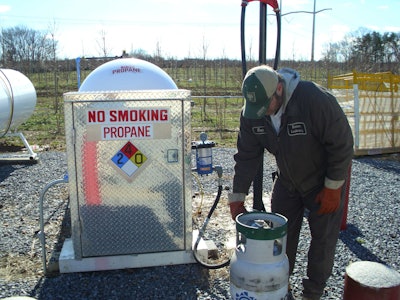 Denison Landscaping & Nursery
Denison Landscaping & NurseryAfter Hurricane Sandy swept through the Northeast in 2012, the use of generators became a number one must-have item.
Because of the storm, more than 8.1 million homes as far west as Michigan lost power, some for more than a week.
These outages spurred demand for generators in the days and weeks after the storm. One New Jersey hardware store fielded an estimated 10,000 calls from people hoping to buy generators, long after it had quickly sold out its stock of 20, according to a Time.com report.
The Propane Education and Research Council has put together a list of benefits users will find when using propane.
1. Propane is easier to access during natural disasters.
Epic lines and exhausted supplies were the norm at scores of gas stations after Hurricane Sandy. Most stations couldn’t operate until power was restored, which took as long as 19 days in some areas. Unlike gasoline and diesel, propane can be stored in a sealed tank or cylinder.
2. Propane-fueled generators can be tailored to precise power needs.
Propane generators are available in sizes ranging from small portable models to whole-house standby systems. A permanent home standby generator can deliver up to 125 kilowatts of power. Within seconds of an outage, this generator can automatically supply power directly to a home’s electrical circuit breaker box. After utility power returns, the generator shuts itself off and waits for the next outage. A portable generator can provide 10,000 watts or more of power.
3. Propane has a longer shelf life.
Propane’s indefinite shelf life makes it an ideal fuel for a back-up generator, which can sit idle for several months between uses. Diesel and gasoline supplies can degrade in a matter of months, or even weeks in storage, failing to power generators when they’re needed most.
4. Propane generators can require less maintenance.
Propane burns cleaner than gasoline or diesel, resulting in less engine wear and lower maintenance costs. Gasoline and diesel generators require regular fuel maintenance involving additives or, in some cases, the costly and hazardous process of flushing and replacing deteriorated fuel. A propane generator doesn’t require any fuel maintenance, other than ensuring your tank is adequately full.
5. Propane is safer.
Propane is stored in sealed above-ground tanks, underground tanks or cylinders, so there’s no risk of spillage. It’s also a nontoxic, nonpoisonous fuel that doesn’t contaminate aquifers or soil. By contrast, as little as one gallon of spilled gasoline can contaminate groundwater above drinking water health advisory levels. Propane’s high ignition point, 940 degrees Fahrenheit, makes it less of a fire hazard than gasoline, which ignites at 430 to 500 degrees Fahrenheit.
6. Propane is greener and cleaner.
Propane is an approved, clean fuel listed in the 1990 Clean Air Act as well as the National Energy Policy Act of 1992. As a low-carbon alternative fuel, propane produces significantly fewer greenhouse gas emissions than diesel and gasoline in a wide range of applications. The Southwest Research Institute in San Antonio has conducted studies on propane emissions and determined that using propane cuts smog-producing exhaust by as much as 70 percent.
7. Propane can efficiently manage other systems.
The same propane supply that fuels a generator can also handle a home’s heating, water heating, cooking and clothes-drying needs.









